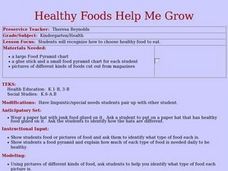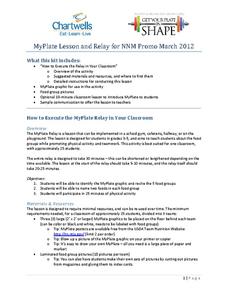Curated OER
Healthy Foods Help Me Grow
Students reconize how to choose healthy food and about why they need to eat healthy.
Curated OER
Super-sized! Is it really a deal?
Students discuss the pros and cons of eating in fast food places. In this adult health lesson, student examine the fat and calorie content of fast food meals. They share ways to make healthy food choices.
Curated OER
Healthy Teeth
Students discuss how unhealthy teeth and gums affect health. In this adult health lesson, students identify foods that are harmful to teeth. They share ways to keep the teeth and gums healthy and disease free.
Curated OER
Eating for Two
Fourth graders keep a food diary and prepare a Healthy Meals Chart regarding foods they eat while pregnant.
Curated OER
Get Fit for Yosemite - Nutrition
Students demonstrate an understanding of healthy eating habits and of following a fitness program. They visit Yosemite Institute.
Nemours KidsHealth
Breakfast: Grades 3-5
Two lessons promote starting the day with a balanced breakfast. Lesson one challenges scholars to create their own cereal after examining their current favorite cereal, including its nutrition facts. In lesson two, learners set their...
Curated OER
Dietician - Nutritionist
There are so many different career opportunities in the health care field. Have learners explore what it takes to be a dietician or a nutritionist. They'll view a PowerPoint on each occupation and take mini-quizzes while they watch. A...
Health Smart Virginia
Suicide Prevention - Finding the Words
Acknowledge, Care, Tell! Freshmen learn how to ACT to help a friend demonstrating warning signs for depression and suicide in a carefully scaffolded, scripted lesson. Scholars also learn positive coping skills, information about support...
Baylor College
Body Mass Index (BMI)
How do you calculate your Body Mass Index, and why is this information a valuable indicator of health? Class members discover not only what BMI is and practice calculating it using the height and weight of six fictitious individuals, but...
Cartwells
MyPlate Lesson and Relay
Youngsters are up and moving in an exciting relay race designed to help them better understand where common foods fall on the MyPlate nutritional guidelines. Working in teams, they identify images of foods and name what food groups they...
Missouri Department of Elementary
Juggling New Opportunities
Life is like trying to juggle three tennis balls! That's the big idea in a lesson that asks freshmen to consider that sometimes juggling the areas of their lives (social/emotion, academic, and career) runs smoothly and sometimes not so...
Nemours KidsHealth
Sports Safety: Grades 9-12
What to do and what not to do when training and playing sports. That is the focus of two activities designed for teens. In the first activity, individuals read research about factors that contribute to safe sport participation and share...
Nemours KidsHealth
Food Safety: Grades 9-12
Food poisoning, salmonellosis, E. Coli, shigellosis, tapeworms—all these words can strike fear into eaters. Alas, the five-second rule is not necessarily true! Two activities teach teens safety rules for food purchasing, preparation,...
Nemours KidsHealth
Peer Pressure: Grades 9-12
Peer pressure is not always negative. It can also inspire, encourage people to get involved, and help push change. Class members select a quotation from a provided list and craft a paragraph about the meaning of the statement, how it...
Nemours KidsHealth
Media Literacy and Health: Grades 9-12
An essential skill for 21st-century learners is to know how to find reliable sources of information. Two activities help high schoolers learn how to determine the reliability of health-related news from websites, TV, magazines, or...
Nemours KidsHealth
School Lunch: Grades 9-12
Go! Slow! Whoa! As part of a study of the nutritional value of foods available on the school campus, groups label those that are fine anytime as "Go" foods. Those that are okay a few times a week get the "Slow" label while those...
Nemours KidsHealth
School Lunch: Grades 3-5
Two lessons encourage scholars to make smart food choices. Lesson one challenges participants to create a five-day meal plan. In lesson plan two, learners pack an imaginary lunch, drawing pictures on a printable lunch bag divided into...
Nemours KidsHealth
Diabetes: Grades 9-12
"We Can Manage" is the theme of the first of two activities in a Kids Health resource that asks scholars to design a leaflet that educates others about diabetes, and suggests ways they can support peers with diabetes. The second activity...
Nemours KidsHealth
Food Allergies: Grades 6-8
Over two lessons, scholars use articles and discussions to define what a food allergy is and identify the most common food allergens. Small groups prepare a skit showcasing how the body exhibits an allergic reaction. Learners examine...
Nemours KidsHealth
Diabetes: Grades 6-8
After reading a series of articles that provide background information about Type 1 and Type 2 diabetes, class members design a meal plan and an activity plan for a weeklong summer camp for 5- to 8-year olds with diabetes. A second...
Nemours KidsHealth
Cold and Flu: Grades 6-8
Wouldn't it be lovely if people were immune from colds and flu? Alas, such is not the case; however, there are things we can do to avoid getting or spreading these pesky health hazards. Middle schoolers read articles that provide them...
Health Smart Virginia
Mindfulness Breathing
The more you practice, the better you get. That's the big idea behind a lesson for middle schoolers about using mindfulness breathing techniques to reduce stress. Class members practice Star Breathing and Rainbow Breathing exercises and...
Health Smart Virginia
Mindfulness Yoga
Standing pose, tree pose, warrior pose, easy pose. Middle schoolers learn several basic yoga exercises and poses that can help them relax. They also keep a four-week stress log to track stressful situations and how they dealt with them.
Curated OER
Our Many Shapes and Sizes
Students discover humans come in all shapes and sizes. In this equality lesson, students evaluate different bodies among their peers and discover no human body is "perfect". Students discuss different ways to keep their bodies healthy.

























